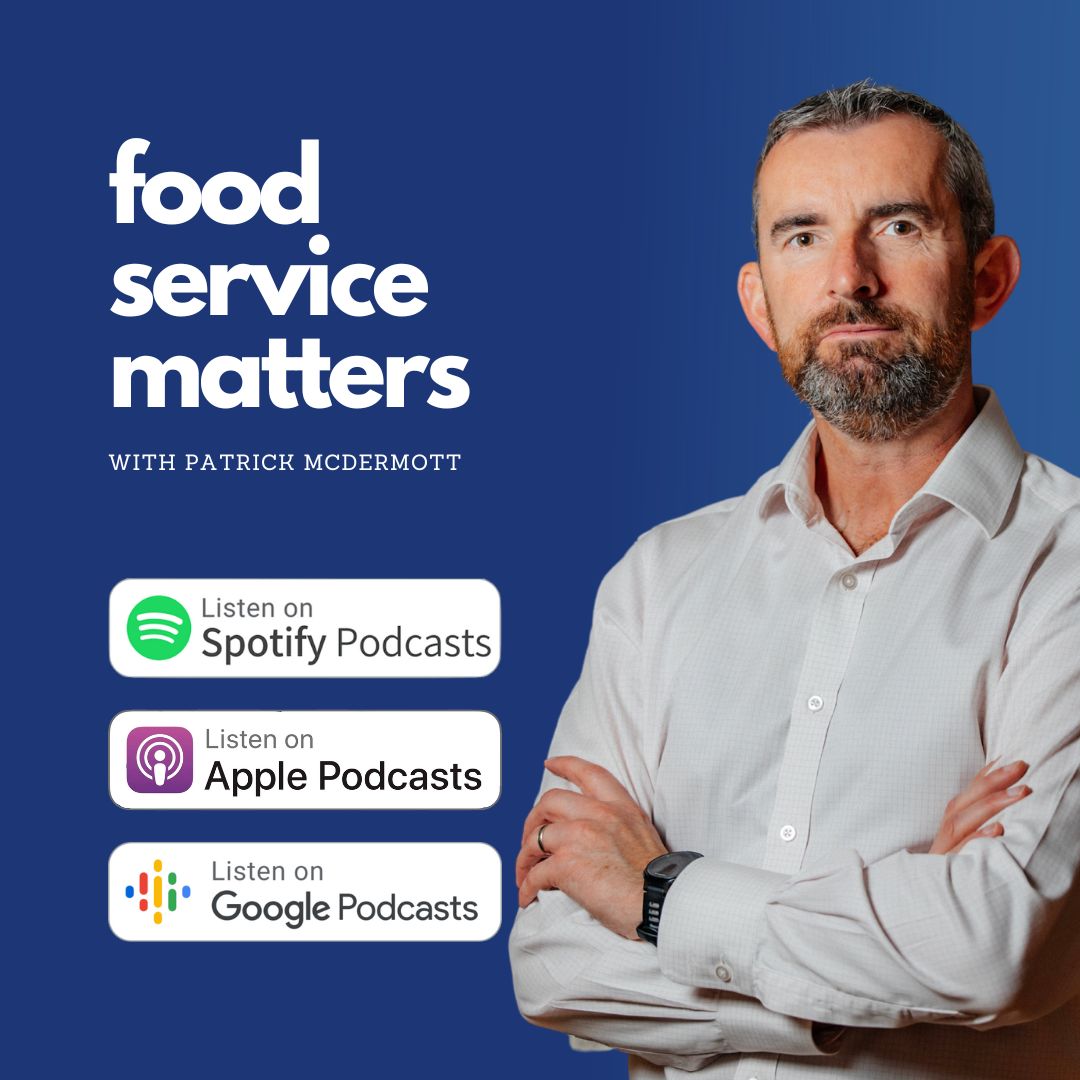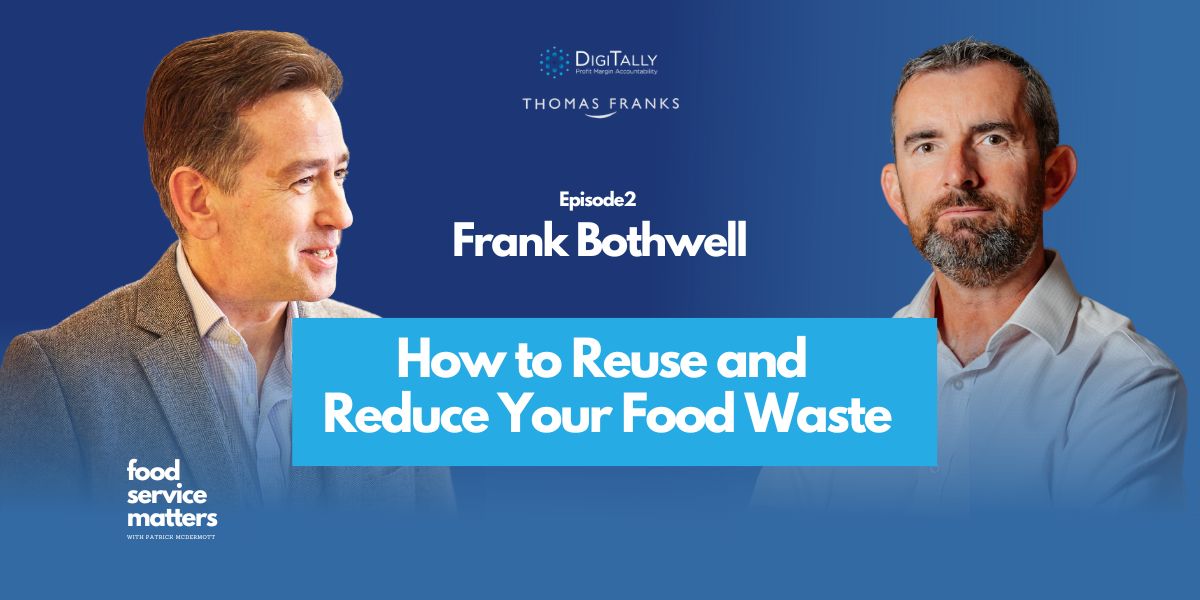Imagine throwing away the weight of a horse in food… That’s a tonne (literally!). Well, in the UK food service industry, we waste the weight of over two million horses each year.
The impact of this food wastage is becoming ever clearer – including environmental damage, economic hardship and food insecurity.
In the second episode of the Food Service Matters podcast, Patrick McDermott talks with Frank Bothwell, Founder & CEO of Thomas Franks. Frank is taking chef-led catering in new directions, focusing on ethical catering, with locally sourced ingredients and exceptional service.
Patrick asks Frank to share why food waste is important to him and Thomas Franks. As Frank explains, “The cost of food at the moment has accelerated the debate on food waste. For some time though, we’ve been very aware of our footprint on society.”
So, what are Frank’s tips for reusing and reducing food waste?
Use food waste better
Frank says the first step is accepting the problem.
“We must understand our impact. Analyse the true cost of food on the environment – and the true cost of throwing that food away when it could be put to good use,” he says.
“We overproduce to waste food. A good example is when we intercepted a whole artic lorry of tomatoes that were destined for a large chain of supermarkets. They had been refused because they were the wrong shade of red. We made 16,000 half-litre pots of tomato sauce, which was frozen and given away to residents of Leeds that have nothing.”
Even if your business does not waste to that extent, wastage is a sin that we are almost all guilty of. The best approach to tackling this issue is to consider a combination of several strategies, depending on your business and the type of food waste you create.
Compost
Composting turns food waste into nutrient-rich soil. In the UK, many councils have composting programmes that restaurants can participate in. In fact, Thomas Franks is currently investing in these initiatives.
“We are installing a bio-digester in each kitchen because they are a brilliant method of taking plate scrapings and minimal kitchen waste and putting it into a machine that produces usable compost within 24 hours,” explains Frank. “You can then use that or sell it on to be pelletised to go into biomass boilers. If there is going to be waste from a kitchen or restaurant, the least you can do is turn it into compost and then reuse that in society.”
Donate
You can donate edible food to a food bank or soup kitchen. Several organisations collect food surplus from restaurants to help people in need or to use for other purposes, such as animal feed.
Frank says, “There are those that are struggling with food poverty – more now than ever before because the real cost of materials is so high. We have to work together as an industry to make sure that food isn’t wasted, and if there is food that isn’t suitable for us, for whatever reason, we must put it to good use through our kitchens and feed those that have nothing, without question.”
How has Frank put this into practice?
“We set up a not-for-profit called Surplus for Purpose. We have a warehouse in Leeds, which intercepts about 30,000 tonnes of surplus food a week. We give that to those that haven’t got anything, or sell to those who do and ensure the profit generated goes back into charity feeding. It highlights the waste and overproduction of food that goes on in society.”
These are just a couple of ideas, with the point being to embrace creativity and find ways to use food waste that work for your restaurant.
Reduce food waste
Frank points out that the biggest impact that they found from their bio-digesters was that “it highlights the food waste because it’s recorded.”
“The minute you start supervising the problem, it goes down – because the whole kitchen is very concerned about ensuring that everything’s reused. And you can reuse things if you think about it. So, it’s not just about putting waste into the bio-digester – that is not the answer. The answer is education and supervision,” he explains.
“We have ambassadors like Vojtech Végh, who’s a famous chef and food waste innovator, and he takes the bins out of kitchens. I’m not saying all kitchens should have no bins, but it makes you wonder what you do with the tops and bottoms of carrots for instance! If you supervise something like food waste, the problem reduces, intrinsically. It definitely doesn’t go away, but it makes people realise that they’re throwing money in the bin. So, food waste and its management are critical in a business.”
Frank continues, “If we supervise something, it will improve without a doubt. But you need leadership, good processes and good systems. Vojtech inspired us with his views on how kitchens could be run by monitoring, questioning and challenging food production. It’s the old adage: if you supervise something, it gets done.”
The responsibility is ours
The time to tackle food waste and set solid ESG goals is now. As Frank says, “If we don’t do it, future generations will have no way forward in terms of coming back from the destruction we’ve created over the last 30, 40 or 50 years.”
To listen to Patrick’s full interview with Frank, check out the Food Service Matters podcast on Spotify.
Patrick is CEO of stocktaking app DigiTally, an intuitive and interconnected stock management system that helps you combat food waste. Why not organise a chat with us today? Click here to book a 30-minute slot with Patrick and ask about setting up a demo.




